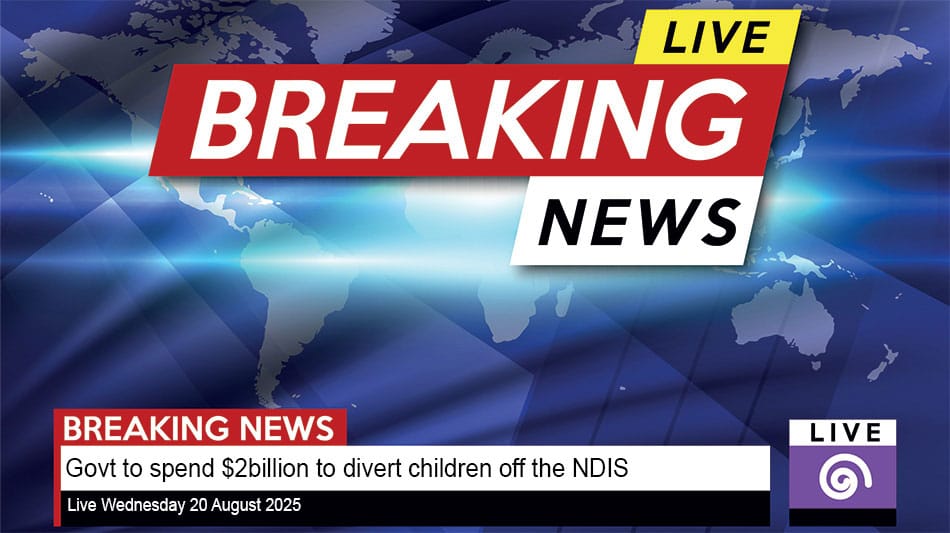$2billion to spend on ‘Thriving Kids’ program to support children with developmental delays and autism
Updated 4th Sept 2025
This article has been updated following the release of the Thriving Kids Fact Sheet by Minister Butler today.
These updates were added:
- Confirmation of age range this affects: children under 9
- Timeline confirmed
- Clarification on how/where the program will be delivered
- Clarification of who will be designing and implementing the program
Health Minister Mark Butler has outlined his plan to establish a new scheme called “Thriving Kids”, targeted at supporting children with development delays and autism.
“Diverting this group of kids over time from the NDIS is an important element of making the scheme sustainable and returning it to its original intent,” he says.
Butler says the government has already made a $2 billion provision in the budget for the Commonwealth’s share.
“Over coming months, we’ll work with the community to design a system to support Thriving Kids and how best to invest the Commonwealth’s $2 billion provision.
“States will obviously be key partners, having committed to share funding equally. But so will service providers and —importantly — parents themselves. I intend to work with those groups directly over the coming months to design Thriving Kids in more detail.“
When will the Thriving Kids program roll out? (updated)
The Government will continue to prioritise work with state and territory governments to finalise the design of Thriving Kids program this year. It is expected the Thriving Kids program would rollout in phases
He says the first services of the program will roll out from July 1 2026 and ramp up over the 12 months after that. This will ensure national services are in place before other planned broader changes to NDIS access arrangements from mid-2027.
Minister Butler said that Thriving Kids will be designed in consultation with the disability community and that paediatrician and childhood development expert Professor Frank Oberklaid AM will lead the consultation efforts.
How/where will the program be delivered? (updated)
The program will grow by strengthening and expanding existing mainstream and community services that already support children and families. This means families can access help in places they already know and trust, including
This includes:
- child and maternal health
- GPs
- playgroups
- early childhood education and care
- schools
- digital and phone-based supports
Who is creating the program (updated)
The Government will work with state and territory governments and experts to finalise the design and implementation arrangements for Thriving Kids.
Design is being informed by the:
- Findings from the Independent Review into the NDIS
- Feedback from the national consultation on Foundational Supports (late 2024)
- Ongoing community consultation across Australia
To support this work, Minister Butler will establish the Thriving Kids Advisory Group, co-chaired by Professor Frank Oberklaid AM., a paediatrician and childhood development expert.
Who will this new program be used by?
The Minister said:
“Diverting this group of kids over time from the NDIS is an important element of making the scheme sustainable and returning it to its original intent. Access and eligibility changes will be made to do that once [it] is fully rolled out,” the minister said.
“Children who are enrolled in the NDIS now or become enrolled before that time will remain on the scheme subject to its usual arrangements.“
Does the Thriving Kids program replace Foundational Supports?
Mr Butler said Thriving Kids was a “refocusing”, not a complete replacement, of what the 2023 NDIS Review called “foundational supports” — a tier of services outside the scheme for those with less profound disabilities, run by the states in settings such as schools, childcare and health services.
Instead, it appears the program would be one significant part of those foundational supports. It is also unclear at this stage how it will be delivered.
Other Supports
The government will also look at the creation of a new Medicare item for bulk-billed 3-year-old health checks to pick up any developmental concerns.
Why are there so many kids on the scheme?
There is huge growth of children with a developmental delay or autism on the scheme.
“Just under half of the scheme’s participants are now children under 15, a share that rose again in this month’s latest quarterly report,” he says.
“Tens and tens of thousands of young children with mild to moderate developmental delay or autism are on a scheme set up for permanent disability. I doubt very much that that is what most of their parents really wanted or expected.”
“But it’s all they’ve had available. The only port in the storm, if you like. And it’s not their fault. They love their children. They want the best for them.”
While the NDIS was originally designed for Australians with profound and lifelong disability, the lack of options elsewhere — especially for kids — has seen the scheme grow faster than expected.
When the NDIS was introduced, state and territory services shut down, leaving parents today with little other options if they want to get support for their child.
Mr Butler said some kids were not getting the best support and others were being “overserviced”.
Will the NDIS rely on a diagnosis or “functional impairment”
Butler says the scheme is broadly moving toward functional impairment, but he says that doesn’t mean people with severe autism will be excluded from the NDIS.
“We should celebrate this scheme as probably the most significant example of social progress in the last 30 years. It has transformed the lives of people living with permanent, significant disability, and I feel very deeply the responsibility to doing everything I can to secure its future for the long term,” Butler says.
He says from July 2027 there will be access and eligibility changes put in place to steer children with developmental delays to Thriving Kids.
What happens to children currently on the NDIS?
No immediate changes for children currently receiving NDIS support—existing plans remain valid for now.
Eligibility and support will continue until their next formal reassessment or review.
From mid‑2026, children with Mild Autism or Developmental Delays are to be transitioned from the NDIS to the “Thriving Kids” program. Full implementation is expected by mid‑2027.
These children will be gradually reassessed and directed toward foundational services provided through schools, GPs, and community supports, rather than receiving individualised NDIS plans.
What do Industry Leaders have to say?
Autism Awareness Australia CEO Nicole Rogerson said, if done right, Thriving Kids could do exactly what the name suggested.
“The devil will be in the detail, but we are talking about putting a system there that will help children currently not thriving get the support they need, and then hopefully get on with their childhood and not needing to be in the NDIS,” she said.
Children and Young People with Disability Australia CEO Skye Kakoschke-Moore agreed the new program had huge potential, but said the one-year timeframe did not leave much time for consultation.
George Taleporos, independent chair of advocacy group Every Australian Counts, said it was crucial future reforms focused on improving outcomes for participants and “not just saving money”.
“Taking children out of the scheme without making sure there is something better in place would risk leaving families high and dry. We cannot repeat the failures of mainstream systems that forced families to turn to the NDIS in the first place,” he said.




